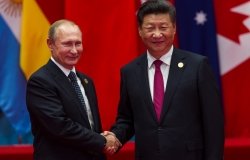North Korea Update: Observations from the Field
Overview
Although North Korea is not faced with food shortages of the magnitude of the late 1990s, the humanitarian situation is still quite grim. Few Americans have had the opportunity to see this reality for themselves. Stephen Linton is a great exception, having traveled to the closed country nearly 60 times. At this January 21 meeting of the Wilson Center's Asia Program, Linton profiled the medical work that the Eugene Bell Foundation has been undertaking in North Korea over the past decade.
Due in large part to restrictions imposed by Pyongyang, there are very few NGOs working in North Korea, despite a desperate need for the innovative solutions such organizations usually offer. The Eugene Bell Foundation is one exception, bringing its own inventive ideas to improve the crippled medical system in North Korea. Roughly half of this work is devoted to tackling tuberculosis (TB). TB is not only a sad reality throughout the country, but is also still a taboo issue, receiving little public attention. As shown throughout the world, with sufficient resources and political will, TB can be easily eradicated. The cost of treating the disease, Linton noted, is quite low; even in the worst cases, a one-year medicine regimen is only 40 USD. The Eugene Bell Foundation is attempting to change TB from a death sentence into a treatable disease, and turn what were once hospices into actual treatment centers where patients may one day leave and return to their homes. Though the North Korean medical system is clearly dilapidated and sometimes nonfunctioning, Linton contended that it is simply not viable to create an entirely new system. Rather, more efficient, cost effective options must be employed.
The Eugene Bell Foundation concentrates its support on providing basic supplies to hospitals and clinics: medicine, equipment, power generators and agricultural support. Linton remarked that the requests made by medical staff in North Korea are sometimes shockingly simple: One doctor wanted an adequate supply of paper, on which she could take laboratory notes. Linton believes that pragmatic, incremental change is necessary to better the situation for patients and doctors alike. Notably, the World Health Organization has repeatedly declared X-rays undesirable means of diagnosing TB. Linton reminded the audience, however, that this type of diagnosis is too common in North Korea to be altogether abandoned. Alternatively, he suggested that outdated x-ray machines, which often cause radiation burns on physicians, should be replaced with modern x-ray equipment that would better protect the caregivers.
Linton's organization is admittedly making only a small dent in addressing the myriad humanitarian problems in North Korea. But, the effects of its work are clear. The foundation's programs treat thirty to fifty thousand TB victims each year. Without treatment, nearly half of these would have succumbed to the disease. In addition, the organization is teaching North Koreans how to tackle this disease effectively. What is more, Linton felt the models created, if replicated nationwide, could help sustain the crippled medical system.
In an off-the-record portion of the meeting, Linton addressed questions concerning the Pyongyang regime and offered suggestions to Washington for more effective U.S. foreign policy toward North Korea.
Robert Hathaway, Asia Program Director, 691-4012
Drafted by Timothy Hildebrandt, Asia Program Assistant, 691-4057
Hosted By

Indo-Pacific Program
The Indo-Pacific Program promotes policy debate and intellectual discussions on US interests in the Asia-Pacific as well as political, economic, security, and social issues relating to the world’s most populous and economically dynamic region. Read more
Thank you for your interest in this event. Please send any feedback or questions to our Events staff.










